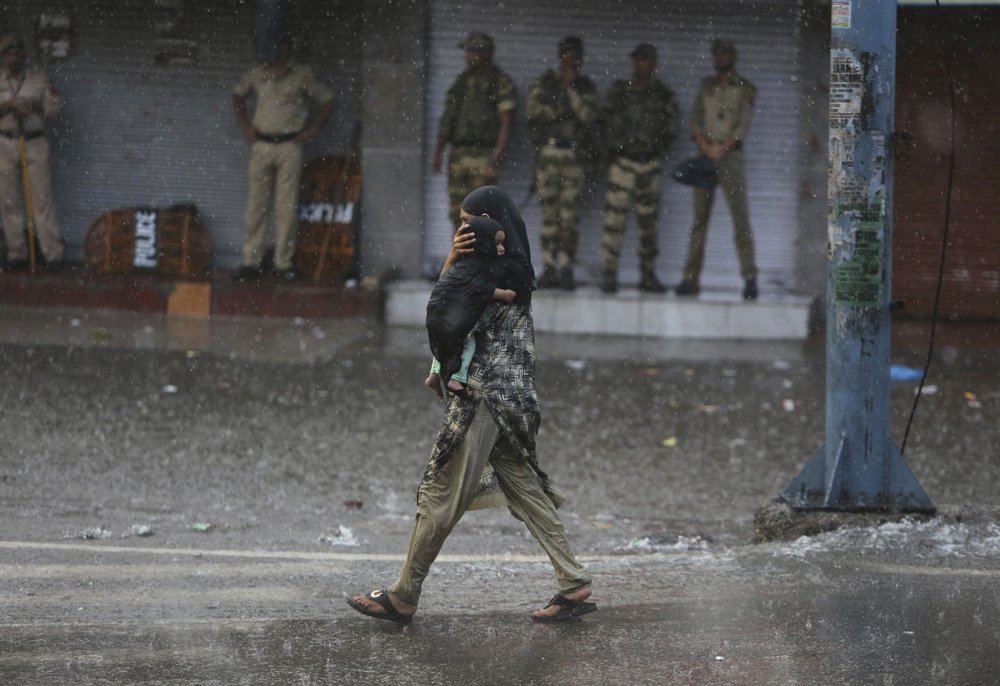'Day of shame': Indian opposition slams BJP move to revoke occupied Kashmir's special status
Indian President Ram Nath Kovind on Monday signed an order repealing the special status granted to Indian-occupied Kashmir under Article 370 of the Constitution — a move vehemently opposed by majority of the opposition.
'BJP murdered democracy'
Ghulam Nabi Azad, a senior Congress leader and Leader of Opposition in the Rajya Sabha — the upper house of India's parliament — in his speech on the floor said: "We [Congress] stand by the Constitution of India. We will do anything to protect the constitution."

"But today, the Bharatiya Janata Party (BJP) has murdered the constitution. It has murdered democracy," he stated.
In a conversation with reporters, Azad said: "These people (the BJP) have come to power lately. They do not know, have not considered the strategic aspects [...] to play around with border state, its people, it is being a traitor to the country."
"[We] never imagined that the NDA government can go this far [and] wipe out the existence of Jammu and Kashmir state."
Vaiko, the chief of Marumalarchi Dravida Munnetra Kazhagam party and a member of Rajya Sabha, said the government had "played with the sentiments of the people of Kashmir" and termed the order as the "murder of democracy".
"You have played with the sentiments of people of Kashmir. When additional army personnel were deployed there, I was worried. Kashmir should not become Kosovo, East Timor and South Sudan. I am opposing this bill [Article 370]. This is a day of shame, shame, shame [...] this is murder of democracy," he was reported as saying.
Congress MP Shashi Tharoor termed the manner in which the legislation was rushed through the parliament "the latest episode of BJP’s continuing drama series 'Flagrant Violations of Parliamentary Procedure'."
"We were treated to the extraordinary & unseemly spectacle of the Lok Sabha “accepting”, by vociferous voice vote & over [opposition] protests, a Bill it had not seen & had not been given!," he said in a tweet.
Rajya Sabha member KC Tyagi, leader of Janata Dal (United) — which is an ally of the National Democratic Alliance — said that his party did not support the repealing of Article 370.
"Our chief Nitish Kumar is carrying forward the tradition of JP Narayan, Ram Manohar Lohia and George Fernandes. So our party is not supporting the bill moved in the Rajya Sabha today. We have different thinking. We want that Article 370 should not be revoked," he said in India's upper house.
'Coup' by BJP
Leader of India's leading Communist party Politburo Kavita Krishnan termed the order as a "coup" in a tweet and called for a protest in New Delhi.
"Presidential order on is Modi govt coup against constitution. Demonetisation was no solution to black money — this coup is no solution for Kashmir. Emergency's midnight knock has reached Kashmir — will soon reach the whole of India. Joint protest at 3pm, Jantar Mantar today."
'Not a wise decision'
Nationalist Congress Party leader Sharad Pawar regretted that the government did not take Kashmiri leaders "into confidence".
"I think Government of India should have taken leaders of the valley into confidence which unfortunately the government didn’t do. And then they should have taken the decision [to revoke 370]," India's news agency ANI quoted him as saying.
According to the Hindustan Times, India's former attorney general Soli Sorabjee said the presidential order to repeal Article 370 was "not a wise decision".
"I don’t think there is anything revolutionary here. It’s a political decision even though it is not a wise decision."
'Kashmir cannot be under curfew forever'
Hindustan Times national editor Chetan Chauhan said India has "gone back on your word on Kashmir by scrapping Article 370. History will judge us as betrayers who were not able to keep word of our forefathers, including Sardar Patel. Cannot imagine what will happen next. People in Kashmir cannot be under curfew forever."
Indian historian Ramachandra Guha likened President Kovind's order to that of former Indian president Fakhruddin Ali Ahmed, who had hastily imposed an emergency in the country after a quick meeting with then premier Indira Gandhi in 1975. To this day, he is criticised for the measure.
Kashmiri journalist Gulam Jeelani asked: "When are we hearing from citizens of Kashmir who were locked down while a decision to change their fate was signed and approved?"





